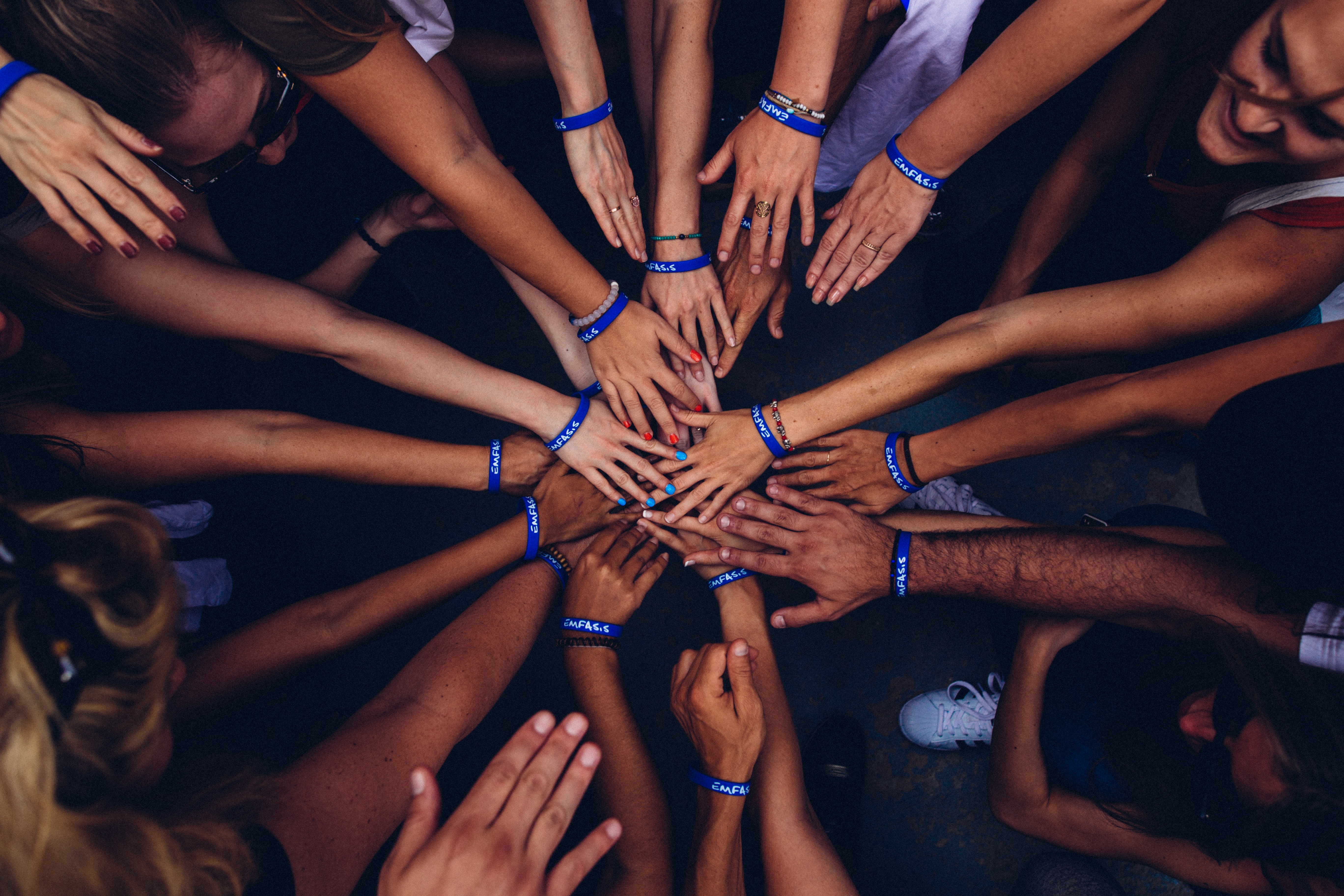🤷🏽♂️ Why Should You Help Others?

In this article, we outline the scientific reasons to help others and get involved with your community.
Whether it’s a small act of kindness, or a large-scale volunteering effort - helping others makes both us, and the recipient, a happy healthy person. Giving selflessly builds strong communities around us, and science has shown it to be beneficial to our own physical and mental wellbeing.

It's not just about money and can be as simple as a kind word, a small gesture, or a volunteering effort. It’s taking a home-baked cake round to your elderly neighbour. It’s telling a close friend how much they mean to you. It’s spending time getting to know the homeless in your city, or looking after someone’s dog for a few days. Giving is the simple act of committing a service to the benefit of others and is psychologically proven to improve our lives. Here are 5 important reasons to help people whenever you can:
1. Careful! It’s Contagious
Research on social networks has shown that if you demonstrate generosity and radiate feelings of happiness; you not only infect your friends with happiness, but you also infect your friends’ friends and friends’ friends’ friends - a social radius of three people. In a study done by Scientific American, participants were each given a $1 bonus and asked to select how much of it they were willing to give to charity, choosing from a selection of 100 charities. Although, it was clear that most people decided to commit their money to a charity, the data was manipulated by the testers and made accessible to all participants. During follow up investigations, it was found that those who had been shown data that made them perceive the other participants as ‘stingy’ with their money, were accordingly more stingy themselves. Those shown the generosity of the other participants, were more generous in their lives afterwards. Conformity is not always a force for good but when it comes to the infection of kindness, it’s incredibly beneficial.
Think about the last time you were in a restaurant and you saw somebody hold the door for someone else. Consider the last time you watched an uplifting video on Facebook whilst taking that first sip of your morning coffee. What about the time you saw somebody escort and elderly woman across the road safely, or rescue a dog from running on the road. These little acts of kindness that we give to one another are more contagious than the common cold and have a lasting impact throughout our day. They are memorable experiences that change our neurochemistry to release Oxytocin - ‘the cuddle hormone’. Oxytocin helps us to form social bonds as a community and feel safe and secure with the people around us. It is the chemical that allows us to enjoy our work, and also gives us feelings of euphoria when we witness the random acts of kindness previously listed. If you remember one thing from this article, remember that kindness is contagious.
2. Finding Purpose
The International Journal of Behavioural Medicine states that helping others has an enormous impact on our level of wellbeing. [1] We feel happier and more respected when we give to others. We all have different interests and different skill sets in life that we have acquired over many years. What appears easy to you may be an impossible task to someone else and sharing your knowledge with them can solve their problem. Imagine if we lived in a world where everyone was doing this; everyone took an active stance towards sharing the knowledge and skills they have with anyone that wants it. Scientists are currently reconsidering the idea of the selfish gene and are exploring the evolution of altruism, cooperation and kindness.[2] It has often been a focus of psychologists to understand whether the help we give to someone else might have a more underlying selfish notion attached to it. What has become clear through all of this however is that no matter what the motivation; making both yourself and someone else feel happier at the same time is definitely something to shout about. What’s better than one person feeling good? That’s right, two or more people feeling good.

When you actively seek to share help and knowledge with other people - whether that be language learning, dog walking, or playing the piano, it allows for the discovery of one’s ‘Ikigai’. Ikigai is a Japanese saying for an individual who has found a purpose in life that he can leverage to the world. Over the last 20 years, scientists have studied the areas on earth where people live the longest - Okinawa in Japan is one of these. Okinawan’s believe that Ikigai is what gives life meaning and actually is proven to make us live longer. When we struggle to find meaning or purpose in our lives, it is often because we have lost the direction of our Ikigai, leading us to a state of despair and loneliness. Helping others is the most proven way to find purpose. In the process of helping someone else to tackle and solve their problems, you often gain clarity in how best to solve your own. A fascinating study in the Personality and Social Psychology Bulletin(2017) explored this concept fully. They measured the difference of outcome between participants who wrote their problems down on paper, and those participants who openly helped others solve problems. The second solution was found to be most effective, with a secondary finding that helping others actually creates a safe space for individuals to talk about their own problems as well. If you ever feel a little lost for purpose or meaning, try and help somebody else in their lives first. You may well be helping the two of you at the same time.
3. Living Longer
Another reason to help others whenever possible is that it actually makes us live longer. For the reasons outlined in the previous point, helping others can reduce our own levels of stress and depression. Studies have found that there is a strong link between mental and physical illness. These emotional states play an enormous role in the regulation of our biological health, and are some of the leading contributors to chronic disease. Stress can affect your thoughts and feelings, and your behavior. If left unchecked it can contribute to many health problems, such as high blood pressure, heart disease, obesity and diabetes. In a study produced by Oxford University, it was found that poor mental wellbeing can actually reduce life expectancy by 10 to 20 years. This is actually just as prevalent, if not more, than smoking itself.
If you want to live a healthy and happy life, look no further than extending your generosity to those who need it. Science has demonstrated that a problem shared ... really is a problem halved. Acting for other people's interests boosts our mental wellbeing massively. The sense of mental clarity and purpose we gain from our service to others not only increases how we feel about ourselves, but also has a physical impact on our life expectancy. No one is suggesting that you can eat cheeseburgers all day providing that you are being generous, but rather your generosity impacts your physical well being more than you know.
4. Gives You Perspective
Many people fail to see the benefit that different perspectives can have on their lives. Sometimes all we need to make us feel better is a little perspective. Albert Einstein famously stated,
“there are two ways that we can live our lives - one is as though nothing is a miracle, the other is as though everything is a miracle.”
The majority of mental pain is caused by the way we view certain events in our lives. Helping others, especially those who are less fortunate than yourself, allows us to consider the events that occur in our own life in a less judgemental and detrimental way.

There is evidence that being aware of your own acts of kindness, as well as the things you are grateful for, can increase feelings of happiness, optimism, and satisfaction. Doing good - looking after someone’s dog, or learning sign language - may help you to have a more positive outlook on your own circumstances - as many of our users here at Helpfulpeeps have found.
5. Restore Community Spirit
There was a quote recently featured in the new Ricky Gervais Series on Netflix - After Life. He meets an elderly woman in the graveyard whom he befriends. She tells him that he needs to improve his actions and to stop being miserable. Using an old proverb (who’s etymology is largely unknown), she tells Tony that
“a society grows great when old men plant trees, the shade of which they never intended to sit under.”
Most people are born good and do good things. Good people do good things for other people - the ultimate heroes at Helpfulpeeps. In a recent study conducted by the NHS Trust, fewer than one in three people in the North East of England said that they’d feel comfortable asking their neighbour to borrow a cup of sugar. Six in ten people surveyed also said they felt they didn’t know their neighbours well at all. Community spirit is the greatest defence to a growing problem of loneliness and your decision to help someone today, could rebuild feelings of inclusiveness and community in everyone.
[1] Post, S. G. (2005). Altruism, Happiness, and Health: It's Good to Be Good. International Journal of Behavioral Medicine, 12(2), 66-77
[2] Vaillant, G.E.. (2008). Spiritual Evolution: How we are wired for Faith, Hope and Love. NY: Broadway Books